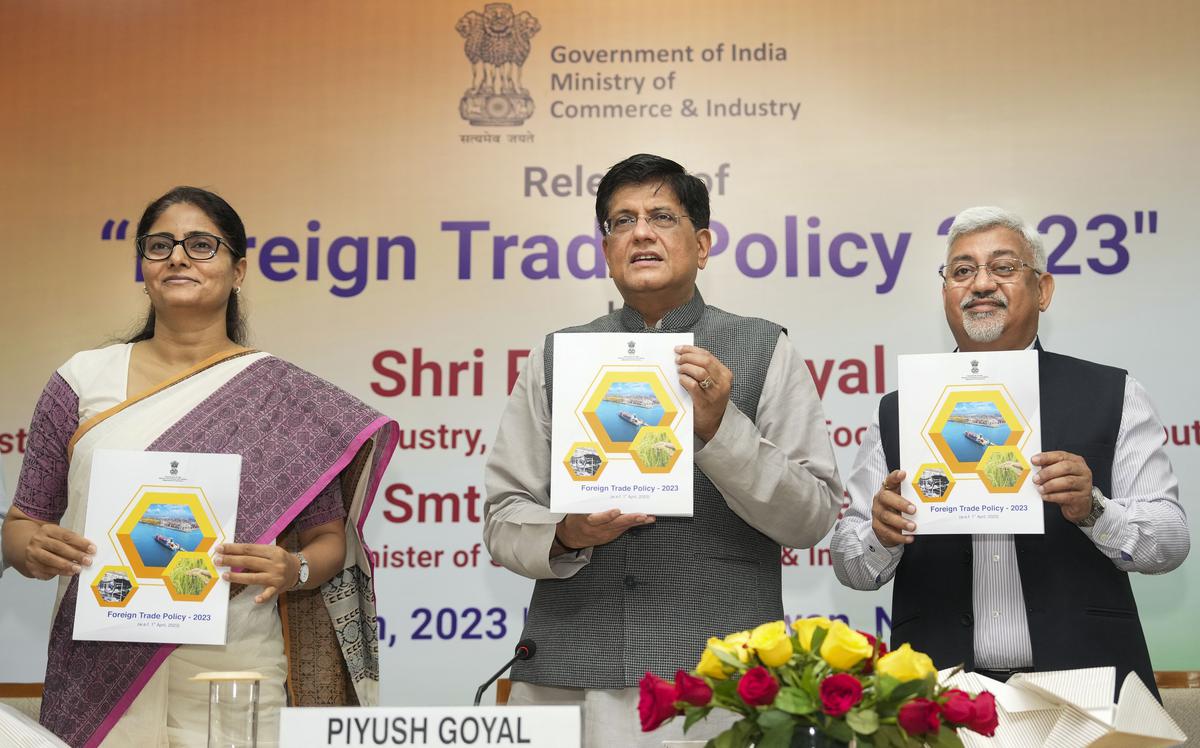Union Minister of Commerce, Industry and Textiles Piyush Goyal on Friday unveiled a new foreign trade policy that, away from providing incentives to exporters, but lowers some costs for small firms and comes with a one-time amnesty scheme for export obligation. With the promise of faster approval. Mistake.
Replacing the existing policy since 2015, the new policy begins in 2023-24 and aims to nearly triple India’s goods and services exports to $2 trillion by 2030 from an estimated $760 billion in 2022-23 To do.
Director General of Foreign Trade (DGFT) Santosh Kumar Sarangi said India’s exports stood at $435 billion in 2015-16, when the previous policy was introduced, and have grown by nearly 75% to an estimated $760 billion in 2022-23.
Union Minister Piyush Goyal during the unveiling of the Foreign Trade Policy 2023. , Video Credits: ANI
no big plans
The new policy will not have any end date and will be subject to change based on the evolving world trade scenario and industry feedback. While the policy will be open-ended, the schemes approved under it will be time-bound.
There is no major new scheme except a one-time waiver under the existing Advance Authorization and Export Promotion Capital Goods (EPCG) schemes, which allow import of capital goods subject to specified export obligations.
open-ended policy
While the industry observed that the policy has little value for service exporters, the minister said that goods exporters need to work a little harder to maintain their growth momentum.
“We will achieve $2 trillion in exports by 2030, but it should not be that merchandise exports are outperforming services exports,” commented Mr. Goyal.
“We have ensured that this policy does not have an end date so that it can be updated as and when required. The approach is to move from an incentive-based regime to a relaxation of the tax regime,” said Mr. Sarangi.
“We are improving ease of doing business by digitizing applications, reducing timelines for processing applications and reducing transaction costs for exporters. The application fee for Advance Authorization and EPCG schemes for MSMEs is being reduced, which will benefit 55% to 60% of the beneficiaries of these schemes,” Mr Sarangi said.
new growth areas
Opening up a new area of potential exports, the policy has included “Merchanting Trade” in its ambit. “Exporters in India can source goods from another country and ship them to a third country without touching Indian shores. It will also enable export of restricted items,” Mr. Sarangi said.
“The focus is on simplifying policies to facilitate exports of dual-use high-end goods and technology such as UAVs [unmanned aerial vehicles]Drones, cryogenic tanks and some chemicals,” he said.

Union Minister of Commerce and Industry Piyush Goyal along with Minister of State Anupriya Patel and Commerce Secretary Sunil Barthwal released the ‘Foreign Trade Policy 2023’ in New Delhi on March 31, 2023. Photo Credit: PTI
one year amnesty
“We are also coming out with an attractive amnesty scheme for exporters who are not able to meet their obligations under the EPCG and Advance Authorization schemes. This is the first amnesty scheme since 2011-12, and may help exporters to close their unfulfilled obligations and push exports further,” the DGFT said.
These two schemes will continue with process changes, including reduction in export obligations for certain items related to green energy development.
Shashi Mathews, Partner, Induslaw said, “One of the most contentious issues related to non-fulfilment of export obligations under Advance Authorization and EPCG schemes can now be resolved under the new amnesty scheme.” However, the actual quantum of benefits under the scheme will be clear only when the fine print becomes known.
Among its export promotion initiatives, the commerce ministry has included a push to promote international trade settlement in the Indian Rupee (INR), which provides benefits to exports that are paid for through rupees.
outreach plan
A special advance authorization scheme is being introduced for the textile and apparel sector to enable them to respond faster to market demands and fashion trends. Other mechanisms such as star rating to give recognition to exporters will be changed to a lower qualifying threshold.
Four cities of Uttar Pradesh – Faridabad, Moradabad, Mirzapur and Varanasi – were declared as Centers of Export Excellence for their performance in apparel, handicrafts, handmade carpets and handlooms respectively. The new trade policy will enable all PM Mitra Textile Parks to avail benefits as common service providers.
Shri Goyal said that the Ministry of Commerce in collaboration with the Ministry of External Affairs and Indian Missions abroad is going to focus on a large scale across the world, either region-wise or country-wise, over the next four-five months.
Commerce Secretary Sunil Barthwal said India’s global share in merchandise exports and services exports is very low and should increase to the range of 7% to 10%. “Even if there are gloomy forecasts about world trade, we should not be discouraged. Our exports should be based on competitiveness rather than subsidies and we are now getting into that mode.